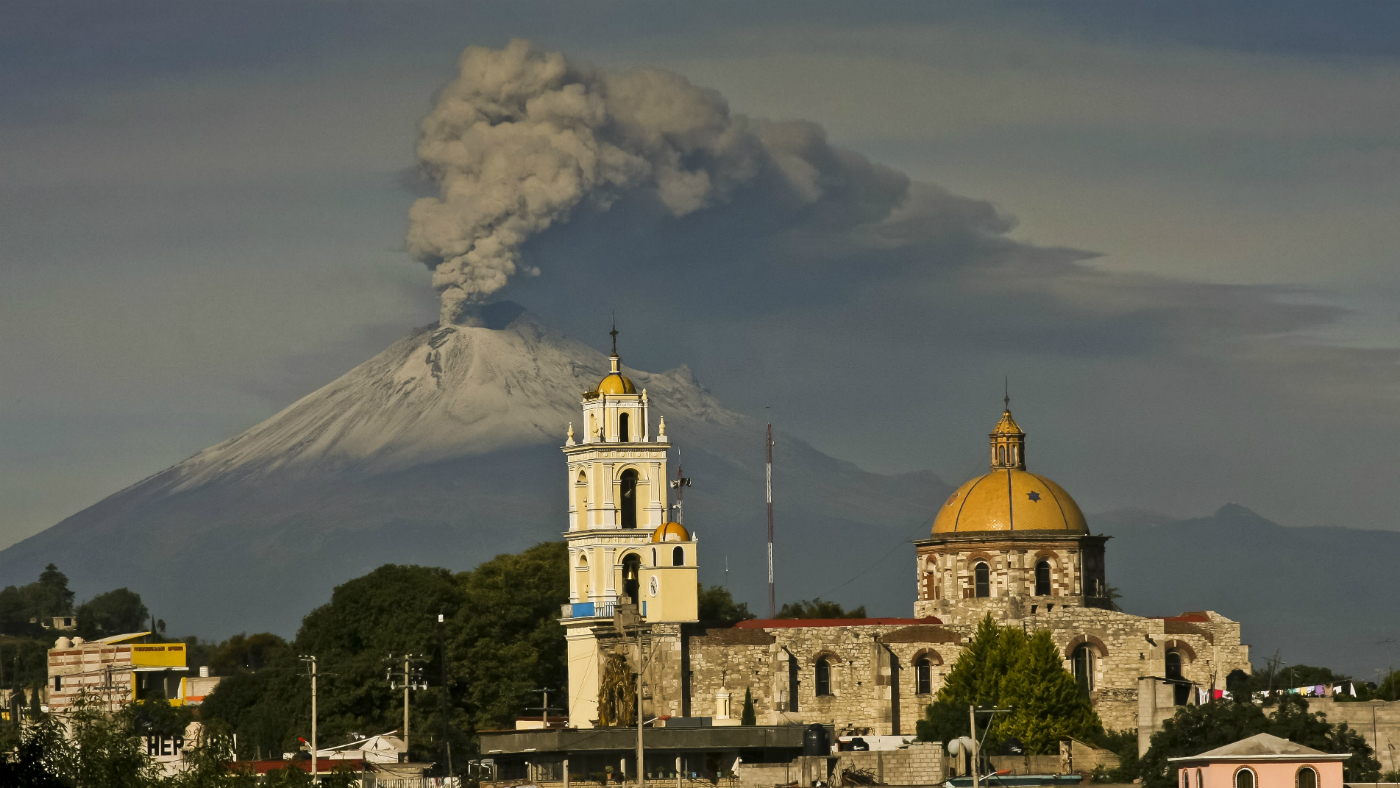The volcanoes likely to erupt next
Scientists have identified high-risk sites by tracking tectonic activity

A free daily email with the biggest news stories of the day – and the best features from TheWeek.com
You are now subscribed
Your newsletter sign-up was successful
A series of violent volcanic eruptions across the globe have grabbed headlines in recent months.
In January, an eruption at Mount Agung in Indonesia disrupted the flights of thousands of holidaymakers. At the start of May, Hawaii’s Kilauea volcano began spewing lava and smoke, sparking mass evacuations and damaging vital infrastructure.
This week, all eyes are on Guatemala, where an unexpectedly violent eruption at Fuego volcano has reportedly killed at least 69 people, with dozens more missing, in one of the worst disasters in the country’s history.
The Week
Escape your echo chamber. Get the facts behind the news, plus analysis from multiple perspectives.

Sign up for The Week's Free Newsletters
From our morning news briefing to a weekly Good News Newsletter, get the best of The Week delivered directly to your inbox.
From our morning news briefing to a weekly Good News Newsletter, get the best of The Week delivered directly to your inbox.
According to the US Geological Survey, there are about 1,500 potentially active volcanoes worldwide, of which some 500 have erupted in recorded history.
Here are the ones considered to pose the highest risk of erupting next.
Oraefajokull, Iceland
Around 5,500 years ago, Iceland experienced a major cooling period. Scientists have discovered that the increase in ice coverage correlated with a decrease in volcanic eruptions in the country, and that the same was true in reverse: when the ice depleted, the number of eruptions increased.
A free daily email with the biggest news stories of the day – and the best features from TheWeek.com
Current trends in climate change indicate that Oraefajokull, Iceland’s largest active volcano, may be heading for an eruption, a theory backed by increased tectonic activity.
Geophysicist Pall Einarsson says the increased number of earthquakes at the site “are telling us that there’s plenty of reason to monitor the course of events carefully”.
An extremely active tectonic region, Iceland made headlines in April 2010 when its Eyjafjallajokull volcano violently erupted. The ash and dust disrupted thousands of flights across the Northern Hemisphere.
Popocatepetl, Mexico
In an article on The Conversation, volcanologists Ralf Gertisser, Katie Preece and Sylvain Charbonnier say that Popocatepetl, southeast of Mexico City, is the country’s most active volcano and remains a source of concern for scientists. After almost 50 years of dormancy, the volcano woke in 1994 and has been experiencing minor eruptions at irregular intervals since.
Centuries ago, large eruptions produced giant mud flows that buried Aztec settlements, and even entire pyramids, Volcano Discovery says.
Up to 25 million people are estimated to live within 60 miles of Popocatepetl, so a major eruption would be likely to cause major devastation. The volcano is also topped with a glacier, which means mudslides might occur.
On 1 June, the Volcanic Ash Advisory Center Washington (VAAC) issued a warning that a major “emission” from Popocatepetl appeared imminent, and that local authorities should remain alert.
Villarrica, Chile
Villarrica volcano is located in the volcanic chain of the Southern Volcanic Zone (SVZ) of the Chilean Andes. It is one of the most active Chilean volcanoes, with 59 documented eruptions since 1558, according to the European Space Agency.
The snow-covered volcano is one of only a small number of volcanoes around the world with an active lava lake.
A gradual increase in seismic activity around the lake, which has produced lava fountains up to 490ft (150 metres) high, has been documented since mid-November 2017.
Villarrica’s last eruption occurred in March 2015, forcing the evacuation of more than 3,000 people in nearby communities.
Ol Doinyo Lengai, Tanzania
Tanzanian volcano Ol Doinyo Lengai, known by the local Masai people as “Mountain of God”, has been showing warning signs of an eruption for more than a year.
In June 2016, scientists placed five sensors around the peak of the 7,650ft (2,330 metres) volcano. Eight months later, the team saw a shudder in the data from one such monitor, The Sun says.
“This movement suggests the volcano is not only merely rumbling, but that parts of it are lifting forward – meaning an eruption is on the cards in the near future,” the newspaper reports.
“Not only could this be catastrophic for local villages, but it could wipe out a historic site nine miles away nicknamed ‘the Dance Hall’, which has a collection of 400 human footprints dating back 19,000 years.”
-
 Political cartoons for February 12
Political cartoons for February 12Cartoons Thursday's political cartoons include a Pam Bondi performance, Ghislaine Maxwell on tour, and ICE detention facilities
-
 Arcadia: Tom Stoppard’s ‘masterpiece’ makes a ‘triumphant’ return
Arcadia: Tom Stoppard’s ‘masterpiece’ makes a ‘triumphant’ returnThe Week Recommends Carrie Cracknell’s revival at the Old Vic ‘grips like a thriller’
-
 My Father’s Shadow: a ‘magically nimble’ film
My Father’s Shadow: a ‘magically nimble’ filmThe Week Recommends Akinola Davies Jr’s touching and ‘tender’ tale of two brothers in 1990s Nigeria
-
 Epstein files topple law CEO, roil UK government
Epstein files topple law CEO, roil UK governmentSpeed Read Peter Mandelson, Britain’s former ambassador to the US, is caught up in the scandal
-
 Mexico’s vape ban has led to a cartel-controlled black market
Mexico’s vape ban has led to a cartel-controlled black marketUnder the Radar Cartels have expanded their power over the sale of illicit tobacco
-
 Iran and US prepare to meet after skirmishes
Iran and US prepare to meet after skirmishesSpeed Read The incident comes amid heightened tensions in the Middle East
-
 Israel retrieves final hostage’s body from Gaza
Israel retrieves final hostage’s body from GazaSpeed Read The 24-year-old police officer was killed during the initial Hamas attack
-
 China’s Xi targets top general in growing purge
China’s Xi targets top general in growing purgeSpeed Read Zhang Youxia is being investigated over ‘grave violations’ of the law
-
 Panama and Canada are negotiating over a crucial copper mine
Panama and Canada are negotiating over a crucial copper mineIn the Spotlight Panama is set to make a final decision on the mine this summer
-
 Why Greenland’s natural resources are nearly impossible to mine
Why Greenland’s natural resources are nearly impossible to mineThe Explainer The country’s natural landscape makes the task extremely difficult
-
 Iran cuts internet as protests escalate
Iran cuts internet as protests escalateSpeed Reada Government buildings across the country have been set on fire